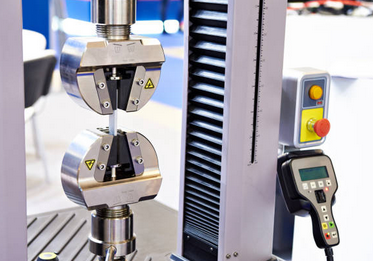Mechanical testing of polymers ensures that a material complies with industry specifications and analyses characteristics such as tensile, flexural, shear and compressive properties. Evaluation of the mechanical properties of plastic and elastomeric materials can be used to predict the durability and performance for use in a multitude of final product applications.
The tensile test is, probably, the most extended method for the mechanical characterization of materials. The fundamentals of the test is to tensile the specimen from its ends until break continuously recording the applied force and the elongation produced in the sample, determining the stress-strain curve characteristic of each material. The basic parameters determined in this test are the elastic modulus, yield stress and yield strain (if exists) and tensile strength, elongation,
tensile, compression, flexural and friction analysis.
The flexural test is mainly used as method for the stiffness determination. This test is almost as usual in hard polymeric materials as the tensile test, and has the advantages of simplifying the specimen machining and avoiding the problems associated with the use of clamps. The most important parameter obtained in this test is the flexural modulus.
In the Impact resistance test a high velocity stress is applied to the specimen. These tests are very useful because impacts are common events during the life in service of materials; hence different methodologies have been developed through the years to assess the resistance of the materials to impact.
CISD carries out two different impact tests, both based on a pendulum: Charpy impact test and Izod impact test. In both cases it is possible to use plain or notched specimens with prismatic geometry, determining the absorbed energy during the break of the material.
The hardness of a material is the resistance to be penetrated by a harder body (indenter) with a specific geometry, its value depends on the elastic modulus and viscoelastic properties of the material.
Depending on the type of indenter, load used and the speed of application of the load, the hardness test has different names. CISD conducts Shore (scales A and D) hardness tests. Shore hardness, the most common in polymeric materials, an indenter with truncated cone geometry is used, and the applied forces are 10 N in Shore A scale, and 50 N in the Shore D scale used for harder polymeric materials.

If you require further advice on tensile properties testing please fill in the form below